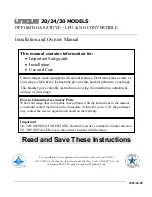
31
3.2 FUEL
Fuel for the stove must not be stored closer than the required clearances to combustibles (heat sensitive
materials). NEVER STORE WOOD IN THE ASH PAN COMPARTMENT.
Your Drolet stove is designed to burn
WOOD ONLY
. Do not burn coal, charcoal, or trash in the unit.
Highly flammable items such as trash may ignite creosote in the chimney (flue), resulting in a chimney
fire. Never burn salt wood, beach wood, chemically treated wood, or wood removed from salt water,
since the deposits left will deteriorate the firebox. Damage caused by chemicals or salt is not covered
under warranty.
Seasoned cord wood is recommended. Wood should be air dried in a covered and ventilated area for a
minimum of six months (one year or more is recommended). This reduces the moisture content of the
wood, resulting in a better stove performance. Wood species with moisture content of 20% or less are
ideal. Dry, seasoned cord wood, can be distinguished from green wood by the cracks at each end of the
logs. Wet or green wood will tend to cause the fire to smoulder, producing large amounts of creosote.
Creosote buildup could result in a chimney fire. This wood will also prove difficult to keep burning
properly, and fires will tend to go out. Green wood produces very little heat, and sometimes causes
customers to think that the stove does not work.
Decayed wood or low-density wood has very little energy content or heating value, and will not burn
satisfactorily for long periods of time. An example of the energy values of some common wood fuels
found un North America
is given in Table 3.2 below.
Wood species
Energy yield
(millions of BTU/cord)
High energy yield
Oak 29
Sugar Maple
28
Beech 26
Yellow birch
25
Ash 24
Elm 23
Medium energy yield
Larch (Tamarack)
23
Red Maple
23
Douglas red fir
23
Silver birch
22
Alder 18
Poplar 17
Hemlock 17
Low energy yield
Spruce 17
Pine 17
Bass 16
Fir 13
Data provided by Energy, Mines and Resources – Canada
TABLE 3.2 Energy yield for wood species







































